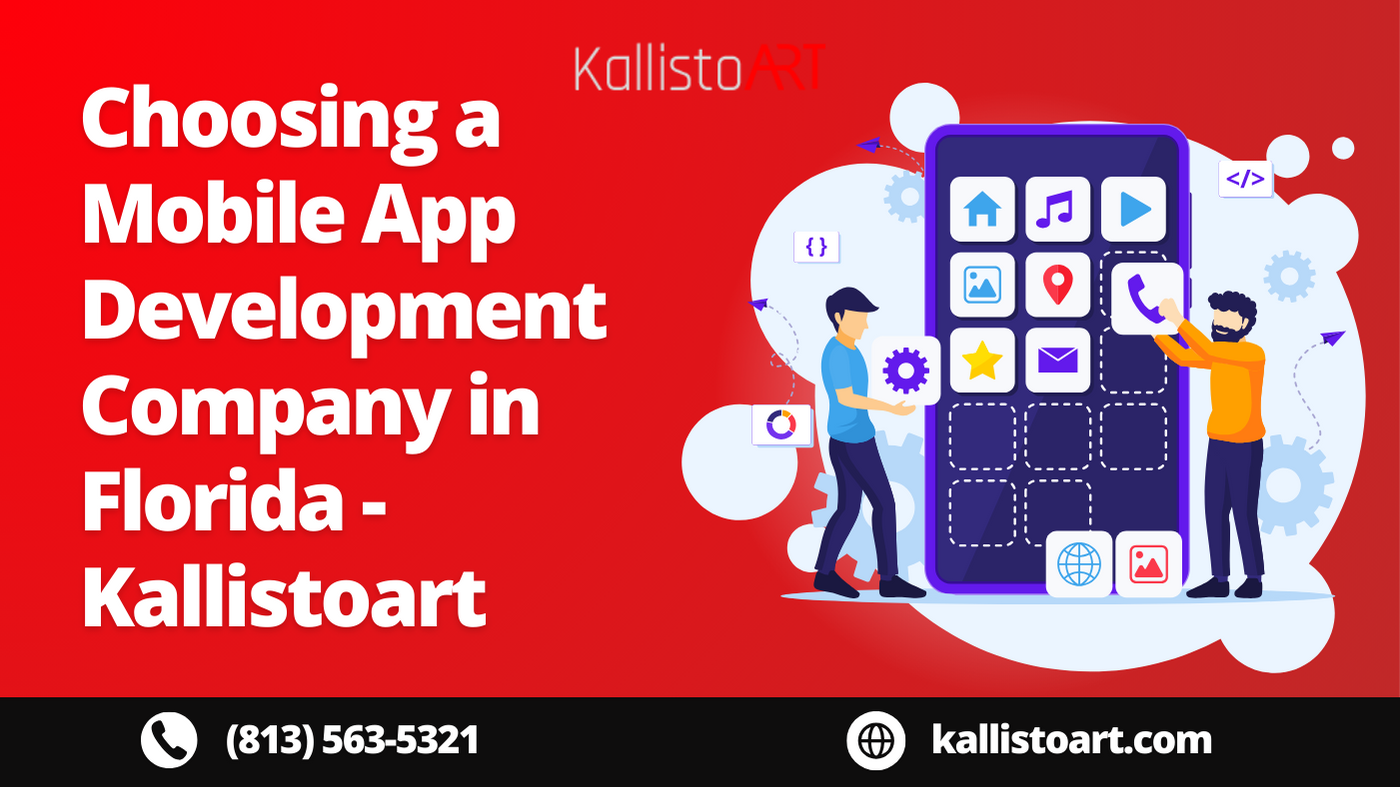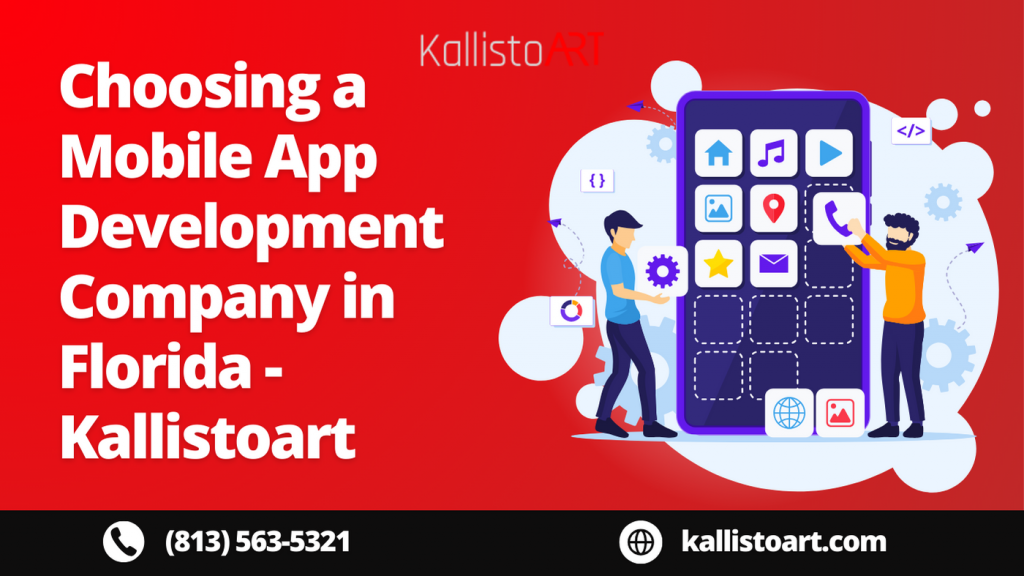
Choosing a Mobile App Development Company in Florida – Kallistoart
 In the bustling digital innovation landscape, mobile apps have emerged as indispensable tools for businesses aiming to thrive in the modern market. From enhancing customer engagement to streamlining operations, the potential of mobile applications is boundless. However, the journey from conceptualization to the realization of a successful app hinges greatly on the expertise and proficiency of the development company behind it. In the vibrant tech hub of Florida, where opportunities abound, selecting the right partner for your app development endeavors is paramount. Join us as we comprehensively explore the factors to consider when choosing a mobile app development company in Florida.
In the bustling digital innovation landscape, mobile apps have emerged as indispensable tools for businesses aiming to thrive in the modern market. From enhancing customer engagement to streamlining operations, the potential of mobile applications is boundless. However, the journey from conceptualization to the realization of a successful app hinges greatly on the expertise and proficiency of the development company behind it. In the vibrant tech hub of Florida, where opportunities abound, selecting the right partner for your app development endeavors is paramount. Join us as we comprehensively explore the factors to consider when choosing a mobile app development company in Florida.
Overview of Mobile App Development
In today’s digitally driven world, mobile applications have become an integral part of our daily lives, revolutionizing how we interact, work, and engage with businesses. From social media platforms connecting friends across the globe to productivity apps streamlining tasks, the versatility and convenience of mobile apps are unparalleled. Mobile app development encompasses the process of conceptualizing, designing, and building applications for smartphones and other mobile devices, catering to a diverse range of needs and preferences. As the demand for innovative solutions continues to soar, understanding the fundamentals of mobile app development is crucial for businesses seeking to leverage technology to stay ahead in the competitive market landscape. Whether you’re a startup looking to disrupt the industry or an established enterprise aiming to enhance customer experiences, embarking on the journey of mobile app development opens doors to endless possibilities and opportunities for growth and success.
Characteristics of an Ideal Mobile App Development Company
When considering the characteristics of an ideal mobile app development company, it’s essential to look beyond just technical expertise. While technical proficiency is undoubtedly crucial, several other factors contribute to the overall success and effectiveness of a development company. Here are some key characteristics to consider:
1. Expertise Across Platforms: An ideal mobile app development company should have expertise across various platforms, including iOS, Android, and possibly others like web or hybrid app development. This ensures that they can cater to a diverse range of client needs and target audiences.
2. Proven Track Record and Portfolio: Look for a company with a solid track record of delivering successful mobile app projects. A portfolio showcasing a variety of apps across different industries demonstrates their versatility and ability to adapt to different client requirements.
3. Innovative Approach to Development: Innovation is key in the rapidly evolving world of mobile technology. An ideal development company should demonstrate creativity and innovation in their approach to app development, staying abreast of the latest trends and technologies to deliver cutting-edge solutions.
6. Scalability and Future-Proofing: An ideal development company should be able to accommodate the scalability needs of your project, whether it’s scaling up to handle increased user demand or integrating new features and functionalities in the future. They should also be proactive in future-proofing your app against technological advancements and industry changes.
7. Quality Assurance and Testing Practices: A strong emphasis on quality assurance and testing is essential to ensure that the app functions seamlessly and meets user expectations. An ideal development company should have robust QA processes in place to identify and rectify any issues before the app is launched.
By considering these characteristics, you can identify an ideal mobile app development company that not only possesses the technical expertise but also the qualities and values necessary for a successful partnership and project execution.
Factors to Consider When Selecting a Mobile App Development Company in Florida
When selecting a mobile app development company in Florida, several critical factors should be taken into consideration to ensure the success and effectiveness of your app project. Let’s delve deeper into these factors:
1. Budget Considerations: Understand your budget constraints and ensure that the development company’s pricing aligns with your financial resources. Consider the value offered about the cost, aiming for a balance between affordability and quality.
2. Project Timeline and Deadlines: Assess the development company’s ability to meet your project timeline and deadlines. Look for a company that can deliver results within your desired timeframe without compromising on quality.
3. Communication and Collaboration: Effective communication and collaboration are paramount for the success of any project. Evaluate the development company’s communication channels, responsiveness, and willingness to collaborate closely with your team throughout the development process.
4. Expertise Across Platforms: Assess the development company’s expertise across various platforms, including iOS, Android, and web. Ensure that they have the technical proficiency and experience to develop high-quality apps for your target platforms.
5. Innovative Approach to Development: Seek out a development company that embraces innovation and stays abreast of the latest trends and technologies in app development. Look for evidence of their ability to deliver creative and innovative solutions that set your app apart from the competition.
By carefully considering these factors when selecting a mobile app development company in Florida, you can make an informed decision that aligns with your project goals, budget, and timeline. Choosing the right development partner is crucial for bringing your app vision to life and achieving success in the competitive app market.
Understanding the Mobile App Development Process
Understanding the Mobile App Development Process is crucial for anyone embarking on the journey of creating a successful mobile application. This process can be broken down into several key phases, each with its own set of tasks and objectives. Let’s delve deeper into each phase:
1. Initial Consultation and Ideation: This phase involves brainstorming and conceptualizing the app idea. It’s essential to define the app’s purpose, target audience, features, and functionality during this stage. Additionally, market research and competitor analysis are conducted to identify gaps and opportunities.
2. Design and Prototyping Phase: Once the app concept is solidified, designers create wireframes and mockups to visualize the app’s layout, user interface (UI), and user experience (UX). Feedback from stakeholders is gathered and incorporated into iterative design revisions until the final prototype is approved.
3. Development and Testing Stages: The development phase begins with coding and programming the app based on the approved design. This stage involves frontend development (UI), backend development (server-side logic), and database integration. Throughout development, rigorous testing is conducted to identify and rectify bugs, errors, and usability issues.
4. Deployment and Distribution: Once the app development is complete and thoroughly tested, it’s ready for deployment to the intended app stores, such as the Apple App Store or Google Play Store. Developers ensure compliance with platform-specific guidelines and requirements before submitting the app for review and approval.
5. Maintenance and Updates: After the app is launched, the work doesn’t end there. Continuous maintenance is required to address user feedback, fix bugs, and introduce new features or updates based on evolving user needs and technological advancements. This phase involves monitoring app performance, analyzing user data, and optimizing the app for better usability and performance.
By understanding and following these phases of the mobile app development process, stakeholders can ensure a systematic and efficient approach to bringing their app idea to life. Effective collaboration between designers, developers, testers, and project managers is essential at every stage to ensure the successful delivery of a high-quality mobile application that meets user expectations and business objectives.
Ensuring Compliance and Security Measures
Ensuring compliance and security measures in mobile app development is crucial to safeguarding sensitive user data and maintaining trust and credibility with your audience. Here’s a deeper exploration of this vital aspect:
1. Adherence to Data Protection Regulations: Mobile apps often handle a plethora of user data, ranging from personal information to financial details. App developers must adhere to data protection regulations such as the General Data Protection Regulation (GDPR) in Europe and the California Consumer Privacy Act (CCPA) in the United States. This involves implementing robust measures to ensure the lawful collection, storage, and processing of user data, as well as providing transparent privacy policies and obtaining explicit user consent where required.
2. Implementation of Robust Security Protocols: Mobile apps are susceptible to various security threats, including data breaches, malware attacks, and unauthorized access. Development companies must prioritize the implementation of robust security protocols to mitigate these risks. This includes adopting encryption techniques to protect data both in transit and at rest, implementing secure authentication mechanisms such as multi-factor authentication (MFA), and regularly conducting security audits and vulnerability assessments to identify and address potential weaknesses in the app’s infrastructure.
3. Secure API Integration: Many mobile apps rely on third-party APIs (Application Programming Interfaces) to enhance functionality and access external services. However, integrating APIs introduces potential security vulnerabilities if not done securely. Developers must carefully vet third-party APIs for security compliance, implement proper authentication and authorization mechanisms, and ensure data transmission between the app and APIs is encrypted to prevent interception or tampering.
4. Ongoing Security Maintenance: Security is not a one-time endeavor but an ongoing process that requires constant vigilance and proactive measures. Development companies should establish protocols for monitoring and responding to security incidents promptly, issuing timely patches and updates to address newly discovered vulnerabilities, and staying abreast of emerging security threats and best practices in the ever-evolving landscape of cybersecurity.
By prioritizing compliance with data protection regulations and implementing robust security measures throughout the app development lifecycle, development companies can instill confidence in users and stakeholders, demonstrating their commitment to protecting user privacy and safeguarding against potential security threats. This not only helps mitigate risks but also enhances the overall reputation and credibility of the app and its developers in the fiercely competitive mobile app market.
Success Metrics and Key Performance Indicators (KPIs)
Success metrics and Key Performance Indicators (KPIs) are essential tools used to measure the effectiveness, progress, and performance of mobile applications. They provide valuable insights into how well an app is meeting its objectives and goals, as well as its overall impact on the target audience and business outcomes. Here’s a more detailed explanation of these concepts:
Success Metrics:
Success metrics are quantitative and qualitative measurements used to evaluate the achievement of specific goals and objectives related to a mobile app. These metrics are directly tied to the overall success and effectiveness of the application and can vary depending on the app’s purpose, industry, and target audience. Some common success metrics for mobile apps include:
1. User Engagement: This metric measures the level of interaction and activity users have with the app, such as the number of daily active users (DAU), session duration, and frequency of app launches.
2. Retention Rate: The retention rate measures the percentage of users who continue to use the app over a specified period, indicating the app’s ability to retain and engage users over time.
3. Conversion Rate: The conversion rate tracks the percentage of users who complete a desired action or goal within the app, such as making a purchase, signing up for a subscription, or completing a form.
4. Revenue Generation: For apps with monetization strategies, revenue-related metrics such as average revenue per user (ARPU), lifetime value (LTV) of customers, and total revenue generated are crucial indicators of financial success.
5. User Satisfaction: User satisfaction metrics, including ratings, reviews, and Net Promoter Score (NPS), provide insights into users’ overall satisfaction and sentiment towards the app.
6. App Performance: Metrics related to app performance, such as load times, crash rates, and error rates, help assess the app’s technical stability and reliability.
Key Performance Indicators (KPIs):
KPIs are specific, measurable indicators used to track progress towards achieving predefined goals and objectives. Unlike success metrics, which focus on outcomes, KPIs often reflect the performance of key processes or activities that contribute to the overall success of the app. Some common KPIs for mobile apps include:
1. Acquisition KPIs: These KPIs measure the effectiveness of app marketing and user acquisition efforts, such as the cost per install (CPI), click-through rate (CTR), and conversion rate from app store visits to installs.
2. Activation KPIs: Activation KPIs assess how effectively the app onboards new users and encourages them to complete key actions or milestones, such as account registration, onboarding completion rate, and first-time user experience metrics.
3. Retention KPIs: Retention KPIs track the percentage of users who continue to engage with the app over time, including metrics like day one retention, week one retention, and churn rate.
4. Engagement KPIs: Engagement KPIs measure the depth and frequency of user interactions with the app, including metrics such as session length, screens per session, and feature adoption rates.
5. Monetization KPIs: For apps with monetization strategies, monetization KPIs such as average revenue per user (ARPU), average revenue per paying user (ARPPU), and conversion rate to paying users are critical for assessing financial performance.
6. Customer Support KPIs: These KPIs evaluate the effectiveness of customer support and service within the app, including metrics like response time to user inquiries, resolution time for support tickets, and customer satisfaction scores.
By tracking and analyzing these success metrics and KPIs, app developers and stakeholders can gain valuable insights into the performance, user satisfaction, and overall success of their mobile applications. These insights can inform strategic decisions, optimizations, and enhancements to continually improve the app and maximize its impact on users and business objectives.
Conclusion
In conclusion, the process of selecting the right mobile app development company in Florida is a pivotal step towards turning your app vision into reality. With the myriad of factors to consider, from technical expertise to client-centric approach and post-launch support, it’s crucial to conduct thorough research and evaluation. By leveraging the insights and guidance provided in this guide, you are equipped with the knowledge to make informed decisions and embark on a fruitful partnership that will drive the success of your mobile app project. Remember, the right development company not only possesses the requisite skills and experience but also shares your vision and values, ensuring a collaborative journey towards achieving your app goals. So, take the time to explore your options, ask the right questions, and choose wisely. With the right mobile app development company in Florida by your side, the possibilities for innovation and growth are endless.
Frequently Asked Questions (FAQs)
Q1. What sets Kallistoart apart as a mobile app development company in Florida?
Ans: At Kallistoart, we distinguish ourselves through our unwavering commitment to innovation, excellence, and client satisfaction. Our team of seasoned professionals combines technical expertise with creative flair to deliver bespoke mobile solutions tailored to your unique requirements.
Q2. Can Kallistoart handle projects of varying complexities and scales?
Ans: Absolutely! Whether you’re a startup with a groundbreaking app idea or an established enterprise seeking to revamp your digital presence, Kallistoart has the experience, resources, and scalability to cater to projects of all sizes and complexities.
Q3. How does Kallistoart approach user experience (UX) and interface (UI) design?
Ans: At Kallistoart, we believe that exceptional UX and UI design are paramount to the success of any mobile app. Our talented design team employs user-centered design principles, intuitive interfaces, and visually engaging elements to create immersive and memorable user experiences.




